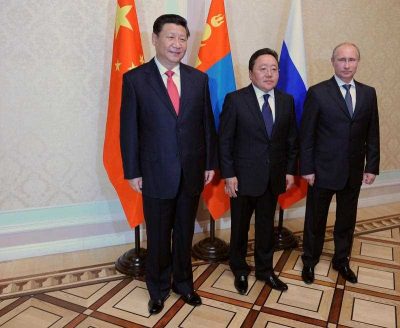Author: Anthony Rinna, Sino-NK
On 14 April 2016 the foreign ministers of Mongolia and Russia signed what they termed a Medium-term Strategic Partnership Development Program in Ulaanbaatar. Plans to establish a strategic partnership between Mongolia and Russia date at least to September 2014, when the presidents of the two countries met in the Mongolian capital.

During his recent visit to Mongolia, Russian foreign minister Sergei Lavrov highlighted plans for increased cooperation between Moscow and Ulaanbaatar in the Shanghai Cooperation Organization (SCO) and at the UN. Lavrov also noted plans to create a China–Mongolia–Russia economic corridor. Officials from the three countries will discuss these plans on the sidelines of the next SCO summit in Tashkent, Uzbekistan.
Mongolia is an important component of Russia’s orientation toward Asia. Its interests in Mongolia are primarily economic. Russian energy company Rosneft supplies Mongolia with 92 per cent of its oil. In return, Mongolia possesses a vast amount of mineral wealth that Russia desires.
Yet bilateral trade between the two countries has declined since 2010. Russian officials would like to see this trend reversed, particularly as China continues to make economic inroads into Mongolia. Mongolia and Russia the possibility of opening a ruble-based credit line for Mongolia. But Moscow appears to be less interested in using Mongolia as an economic link to broader Eurasian markets than China. Russia’s main priority is more tightly focused on maintaining a privileged position in the Mongolian energy and mining sectors.
Russia will likely increase, in a limited fashion, its influence in East Asia through its enhanced relations with Mongolia. Mongolia, likewise, may diversify its economic position in international markets. Yet the concept of ‘strategic partnership’ is not clearly defined. The term’s ambiguity allows for considerable flexibility. In Mongolia’s case, the loose definition may prove problematic for its attempts to implement a policy of official neutrality.
In late 2015 Mongolian President Tsakhiagiin Elbegdorj opened the debate regarding official Mongolian neutrality to the public and the topic is high on the agenda in Mongolia’s current session of parliament. In Elbegdorj’s view, Mongolia has essentially been a de facto neutral country for several years. Mongolia’s foreign policy is centred on diversifying its economic and security partnerships beyond the geographic confines of its neighbours China and Russia, while not aligning fully with any one country or bloc.
Mongolia’s multi-vector policy of reaching out to the West, as well as other countries such as Japan and Turkey, is billed as the ‘Third Neighbour’ policy, based on a statement by former US secretary of state James Baker in 1990. Mongolia’s geographic vulnerability toward China and Russia underlies the continued use of this term to describe Ulaanbaatar’s external relations.
Mongolia’s multilateral defence policy is based on limited cooperation with China, Russia and the United States, as well as with larger groups such as the North Atlantic Treaty Organization (NATO) and the SCO. Mongolia is an observer at the SCO, and could become a member. Mongolia also participates in NATO’s Individual Partnership and Cooperation Programme. As John Daly of Johns Hopkins University maintains, Mongolia’s policy of military multilateralism is part of the country’s strategy to maintain its sovereignty and independence.
The principle of neutrality mostly relates to Mongolia’s defence relationships, while strategic partnerships largely concern international trade and exchange. Declared neutrality does not conflict with forming strategic partnerships: neutral Switzerland, for instance, recently announced its intention to enact a strategic partnership with China.
But the problem for Mongolia is the country’s dependence on China and Russia in the economic sphere. Viktor Samoylenko asserts that neutrality is feasible only when a country is not overly dependent on external financing and investment. Mongolia’s economic growth rate declined from 7.9 to 2.3 per cent between 2014 and 2015, and foreign direct investment dropped by a third over the same period. Mongolia exports far more to China than to Russia, though Mongolian imports of Chinese and Russian goods (excluding energy) are more balanced between the two countries.
The realisation of a Mongolia–Russia strategic partnership may prompt the development of a more balanced trade relationship for Mongolia and bolster the country’s ailing economy. Yet it could also increase Mongolia’s sense of economic dependence on Russia, particularly as an economic counterweight to China.
As traditionally defence and security-oriented blocs such as the SCO expand their mandate into the economic sphere, the lines between trade and security in defining regional relationships have become less distinct. The onus therefore will be on Mongolia to sustain economic relationships beneficial to its economy while maintaining sufficient strategic distance between its security partners.
Anothony V. Rinna is Russia and Eurasia Analyst at Sino-NK.
Source:http://www.eastasiaforum.org/







0 comments:
Post a Comment